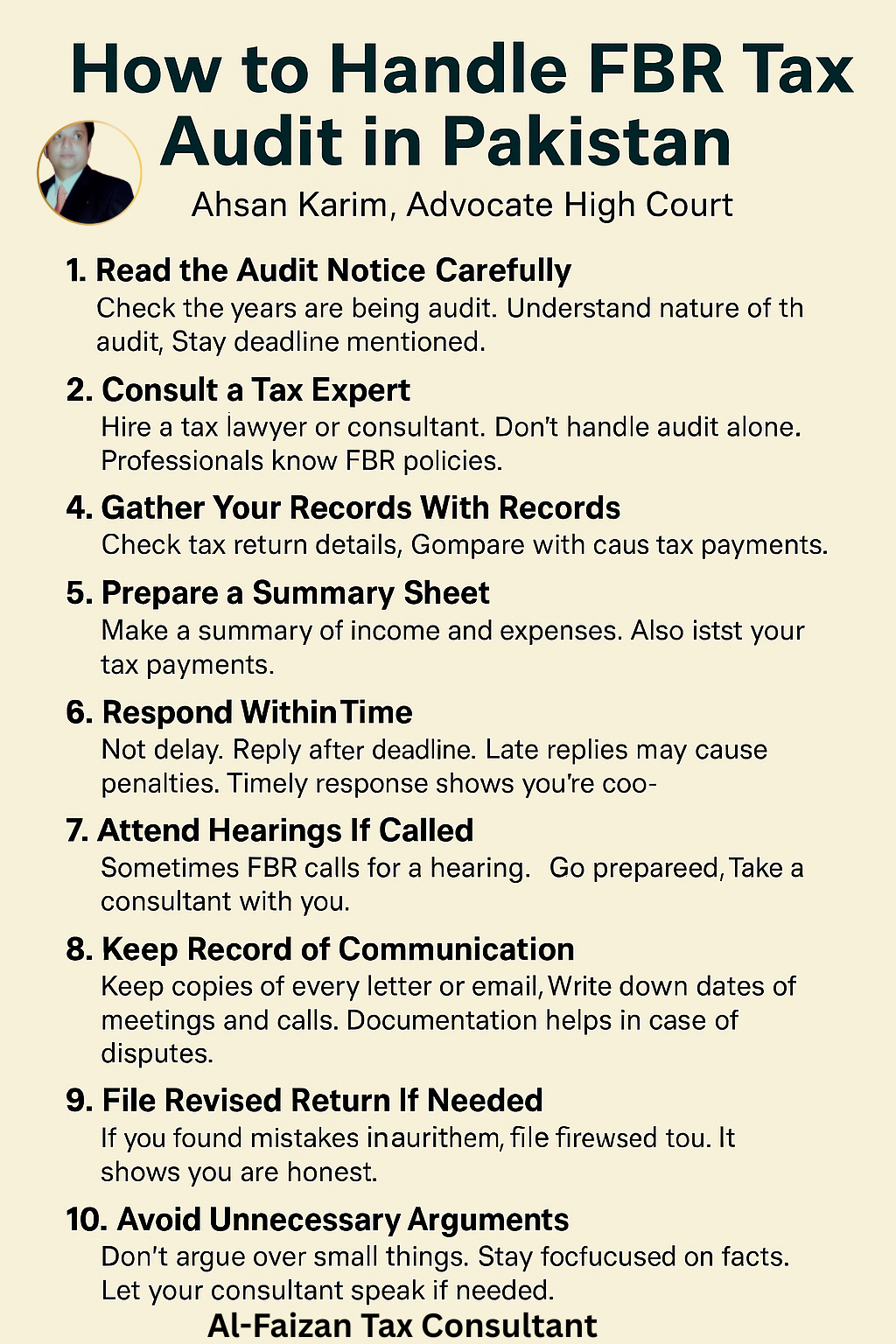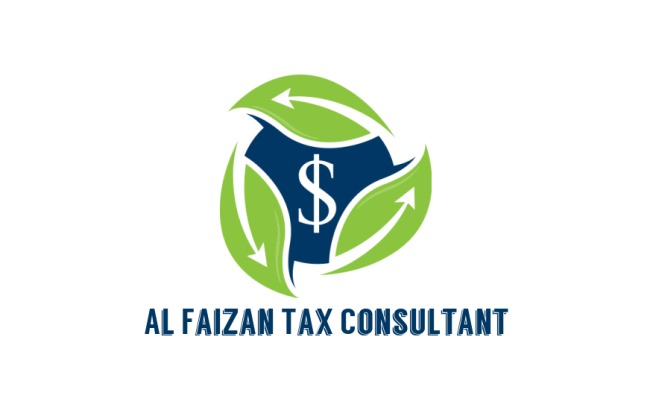How to Manage an FBR Tax Audit in Pakistan?
We are on the mission of promoting tax culture in Pakistan, that’s why we are writing series of articles on tax solutions to facilitate the general public. Today we are going to write a detailed guide on a hot trending issue about facing the FBR tax audit in Pakistan. If you like this article then please share it with your friends and family.
How to Face FBR Income Tax Audit in Pakistan? A to Z Guide For All
Getting a tax audit notice from FBR is scary. It can stress any businessperson or salaried person. But don’t panic at all. It’s normal. It happens with thousands of taxpayers every year. Some are picked randomly. Some due to mismatches or non-compliance. But if you deal smartly, you can handle it well.

How to Handle FBR Tax Audit in Pakistan?
All you need is patience, documents, and a good strategy. Here’s a step-by-step guide written in simple language. Each step is important. So don’t skip any point.
1. Read the Audit Notice Carefully
Don’t rush. Sit down. Read the notice with full attention. Look for the tax years being audited. Check if it’s about income tax or sales tax. Or both. Read which section of tax law is mentioned. It tells what type of audit it is. Also note the deadline. Mark it in your calendar. Don’t miss it. List down the required documents. Prepare your checklist. Understanding the notice is the first step to avoid confusion later.
2. Stay Calm and Professional
Yes, it’s hard to stay calm. But you need to be. Anger or panic won’t help. FBR officers are trained. They deal with many cases daily. So you should stay polite. Never argue in anger. Speak respectfully. Your professional attitude will impress the officer. It may reduce the harshness of the audit.
3. Consult a Tax Expert Immediately
Don’t face the audit alone. Even if you filed your return yourself. Audits can be technical. Mistakes may cost you money. Hire a tax consultant or lawyer. Someone with experience. Share all details honestly with them. They will guide you properly. Tax experts know what FBR looks for. Their help can save you from notices, penalties or tax recovery.
4. Gather Your Records Neatly
Start collecting all records immediately. Include income sources and expense proofs. Also collect utility bills, bank statements, rent receipts, salary slips etc. If you claimed deductions, get those proofs too. Arrange them in folders. Don’t give loose papers. Give files that are well-organized. Make copies. Label everything. Well-arranged documents always make a good impression.
5. Match Tax Returns With Real Documents
Take your tax return copy. Compare it with your actual records. See if everything matches or not. If there are mistakes, fix them before audit meeting. Matching the return and actual records is key. Don’t give FBR a reason to doubt your case. Be honest about any difference found.
6. Prepare a Summary Sheet
Make a one-page summary of your income, expenses and tax paid. Mention main sources of income. Also write business nature. This helps FBR officer understand your case fast. It also shows that you are cooperative. A summary saves everyone’s time.
7. Respond Within Given Time
FBR gives a timeline. Don’t delay your reply. Late replies can lead to extra penalties. Or they may issue best judgment order. That means extra tax without your explanation. So act on time. Timely response shows you’re serious. It creates a good impression.
8. Attend Hearings If You Are Called
If FBR officer calls you for a hearing, don’t miss it. Go on the exact date and time. Dress properly. Speak politely. Let your tax consultant talk if needed. Always keep documents with you in the hearing. Answer briefly and honestly. Don’t try to confuse the officer. Simplicity works best.
9. Don’t Hide Any Information
Hiding facts is risky. FBR can trace bank accounts, property, vehicles, everything. So better to disclose everything. If they catch hidden income, you may face big penalties or even criminal case. So be open. Tell everything to your consultant as well.
10. Keep a Record of All Communication
Always keep copies of emails, letters, notices, replies. Save soft copies and hard copies both. If you meet any officer, note down the date, place and what was discussed. Keep proof of document submissions. These can help later if any dispute arises.
11. File a Revised Return If Necessary
If during preparation, you find your return had mistakes, don’t worry. Just file a revised return. Inform FBR in writing. Tell the officer too. This shows you are honest. Many cases are settled just because of honest revised filing.
12. Avoid Arguments and Emotional Talk
Audits are not courtroom battles. Don’t argue over small matters. Don’t show attitude. Don’t talk emotionally. FBR officers follow rules. Focus only on your documents. Let your expert do the technical talk. Being aggressive or over-smart can damage your case.
13. Ask for Time If You Need It
If you need more time to gather data, request for extension in writing. FBR officers usually allow it. But request should be genuine. Always make requests before the deadline. Last minute excuses don’t work.
14. Follow Up Regularly
Don’t wait for FBR to contact you again. Do regular follow-ups. Call or visit if needed. Keep in touch with your case officer. A silent taxpayer may face delays or even harsh orders. So follow up and stay active.
15. Stay Updated About Tax Laws
Tax rules keep changing. Stay updated. Join tax WhatsApp groups. Follow FBR website. Read tax blogs. Being aware helps in audit. You can understand notices better. And avoid future audits too.
16. Figure out What the Audit’s About
Don’t just jump into grabbing papers. First, understand what this audit is. Is it a desk audit? Like, they check stuff from their office? Or a field one, where they visit you? Look if it’s checking everything or just some deals. The notice might say stuff like Section 177 (that’s a full audit) or Section 38 (sales tax thing). Knowing this helps you focus. You won’t waste time or miss important bits. If the legal words confuse you, ask your tax guy to explain.
17. Check if FBR’s Notice is Legit
Make sure the notice is real. And from the right FBR office. See if the officer who signed it can actually handle your case. Like, based on where you live or what tax you pay (big taxpayers go to RTO, smaller ones to other units). Sometimes they send wrong notices. Or ones they shouldn’t. Check it quietly with your consultant. Or call FBR’s helpline. This saves you from following a fake notice. And keeps your rights safe.
18. Look at Your Old Tax Returns
Don’t just think about this year’s audit. Go back and check your last 3-5 years of tax filings. See if your income, expenses, and deductions match up. FBR loves comparing old returns. They spot things like sudden money jumps or property you can’t explain. If you find mistakes, talk to your consultant fast. Like, if you showed low income but bought a house, have an answer ready. Being consistent makes you look honest.
19. Get Ready for FBR’s Questions
FBR always asks certain things. Like unreported money, expenses that seem too high, or bank stuff that don’t match. Be ready for questions like, “Why’s your bank balance more than your income?” Or “Where’s proof for this deduction?” Practice short answers with your tax guy. If you run a business, they’ll ask about sales, tax claims, or stock records. Being prepared cuts down surprises. It shows you’re on top of things.
20. Know About Penalties and Deals
If they find mistakes, penalties can hit. Like, 50% extra for hiding income. Or Rs. 25,000-100,000 for not following rules. Talk to your consultant about negotiating. Specially for small errors. Sometimes fixing things early lowers the penalty. Never try bribing—that’s illegal and super risky. Stick to proper ways, like filing a corrected return or appealing.
21. Plan What’s Next After the Audit
When the audit’s done, FBR sends an order. It says what they found, extra tax, or fines. Read it careful with your consultant. If it’s okay, pay up quick to avoid more trouble. If you don’t agree, you got 30 days to appeal. That’s to the Commissioner Inland Revenue (Appeals), under Section 127. Collect proof to back your side—appeals need solid papers. Think about this early so you’re not rushing later.
22. Fix How You Keep Records
An audit’s a big warning. After it’s over, get better at tracking your stuff. Try software like QuickBooks. Or FBR’s Malia tool for live updates. For shops or businesses, save invoices, receipts, and ledgers online. Back them up. Match your bank statements with tax filings regular. Good records mean less audit headaches next time.
23. Learn Your Rights as a Taxpayer
Know what you’re allowed under Pakistan’s tax laws. You deserve a fair hearing. You can see audit results. And you can appeal if needed. FBR can’t just take your stuff without proper steps. Or ask for papers they don’t need. If you feel bullied, complain to the Federal Tax Ombudsman. Knowing your rights helps you stay calm and strong during the audit.

The Audit Process in Detail
Here’s how FBR runs an audit, so you know what to expect:
- Notice Arrives (Section 214A): The Commissioner picks you and sends a letter. It spells out the tax year and papers needed. Start prepping right away.
- Audit Happens (Section 214B): Officers check your stuff—maybe at your place or theirs. They dig into records, ask questions, or even check digital files. They can talk to others if it helps.
- Privacy Matters (Section 214C): Your data stays secret. Officers face penalties for leaks, so your info is safe.
- Problems Found?: You’ll get a show-cause notice listing issues, like unpaid taxes. Reply with proof. Then they set your final tax.
- No Help? Best Judgment (Section 214D): Ignore them, and they estimate your tax. It’s often high, so don’t risk it.
- Settling Easy: For small issues, try an Agreed Assessment. Offer a fix via the Assessment Oversight Committee. It’s faster than appeals, but not for fraud.
What is Tax Audit?
A tax audit is when the Federal Board of Revenue (FBR) checks your financial records. They want to make sure your tax returns are correct. It’s about confirming you paid the right tax. They look at things like bank statements, receipts, invoices, and account books. The rules for audits come from the Income Tax Ordinance 2001, mainly Sections 177 and 214. These laws explain how audits work and what rights you have.
Why Does the FBR Pick You for an Audit?
Nobody wants an audit, but knowing why you might get picked helps. Here are some reasons:
- Big Earners: If you make a lot of money, your chances go up. High incomes often mean complicated finances, so FBR looks closer.
- Business Folks: Running a business? Your transactions can be tricky. That makes audits more likely than for salaried people.
- Big Return Changes: Made major tweaks to your tax return? That can catch FBR’s eye. They’ll want to know why.
- Tips or Complaints: If someone reports you—like another taxpayer or even a news story—FBR might dig in.
- Not Filing Returns: Skipping your tax return is a huge signal. It screams non-compliance, so expect an audit.
- Random Picks: FBR uses computers to pick cases. Sometimes it’s just luck, like a random draw.
- Yearly Focus Areas: Every year, FBR has an Audit Policy. It might target certain businesses or industries. They don’t always share details, but some sectors get more attention.
How Does a Tax Audit Work?
Audits follow clear steps. Knowing them makes things less scary.
- Getting the Notice (Section 214A): It starts with a letter from the Commissioner. This notice tells you you’re being audited. It lists the tax year and what documents they need. Read it carefully and start gathering stuff.
- The Audit Itself (Section 214B): Officers do the checking. They might visit your office or work from theirs. They’ll look at your records—think invoices, bank details, or ledgers. They can ask questions or even talk to others if needed. They’re allowed to check digital files too, like your computer data.
- Keeping Things Private (Section 214C): Your info is sensitive. FBR officers must keep it secret. If they leak anything, they face trouble. This protects you during the audit.
- Issues Found? Show-Cause Notice: If they spot problems, you’ll get a notice. It explains what’s wrong, like underpaid taxes. You need to reply with proof or explanations. After that, they decide your final tax amount.
- No Cooperation? Best Judgment (Section 214D): If you ignore them or hide stuff, they guess your tax. This is called Best Judgment Assessment. It’s based on what they know, and it’s often not in your favor.
- Disagree? Appeal: Don’t like the final decision? You can appeal. First, go to the Commissioner (Appeals). Then, maybe the Appellate Tribunal or courts. You’ve got 30 days to start.
- Settling Without a Fight: Sometimes, you can make a deal. It’s called Agreed Assessment. You offer a fix, and a committee reviews it. It’s quicker than appeals, but not for fraud cases.
Your Rights and Duties
You’ve got rights during an audit, but also responsibilities.
Rights:
- Know why you’re audited.
- Understand what they’re checking.
- Ask questions if you’re confused.
- Hire a tax expert to help.
- Appeal if you think they’re wrong.
- Expect your info to stay private.
Duties:
- Work with the FBR.
- Give true and full details.
- Show up for meetings if asked.
- Keep your records neat.
Summary of Tips to Handle FBR Tax Audits Well
Audits aren’t fun, but you can make them easier:
- Stay Organized: Keep your papers in order all year. Have receipts, returns, and statements ready.
- Reply Fast: Answer FBR notices quickly. Don’t drag your feet.
- Be Nice: Stay calm with officers. Arguing doesn’t help.
- Get Help: A tax pro can guide you. Don’t go solo if it’s tough.
- Check Their Report: Read the audit results closely. Spot mistakes? Speak up with proof.
- Know Appeals: If you disagree, learn how to appeal. Don’t miss deadlines.
- Track Everything: Save all letters and notes from the audit. It’s handy later.
The Law Behind Audits
Two big rules control audits:
- Section 214: Covers how audits start, run, and end. It includes rules for privacy and guessing taxes if you don’t help.
- Section 177: Lets FBR ask for records going back six years.
Final Words
Facing a tax audit is not the end of the world. With honesty, preparation and expert help, you can manage it well. The key is to stay calm, submit on time, and cooperate. Don’t take shortcuts. And don’t ignore notices. FBR can be strict, but also fair if you deal rightly. In the last i would love to admit that there are some hidden and technical techniques too for managing FBR income tax audit which we lawyers use to handle such situations, you call them our trade secret which we disclose to our clients only. I hope that you will not mind this truthful reality. Stay blessed always. I Ahsan Karim adv HC recommend you to read my following article too;
All About Getting ITP License (Income Tax Practitioner) in Pakistan From FBR

I H.Dr Ahsan Karim is an advocate high court and old Ravian. I did my LLB from Punjab University Lahore in 2002. I am working as webmaster and social media manager too in Al-Faizan Tax Consultant. I have written more than 7000 articles on various topics.
